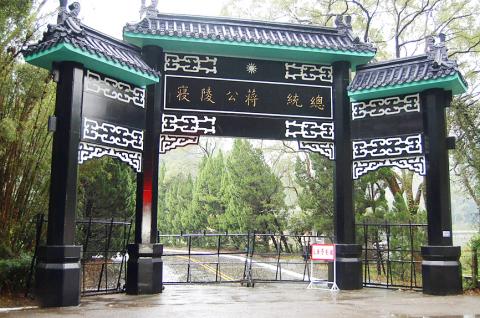A senior government official yesterday warned that the mausoleum of former president Chiang Ching-kuo (蔣經國) might be in danger due to its proximity to a faultline.
The bodies of Chiang Kai-shek (蔣介石) and his son Chiang Ching-kuo were not buried. Chiang Ching-kuo’s body was preserved at a mausoleum in Taoyuan’s Dasi District (大溪) and Chiang Kai-shek’s remains were entombed at a mausoleum in Tzuhu (慈湖).
Both mausoleums are old and require a lot of money to repair, said the official, who declined to be named, adding that repairs last year to the Chiang Ching-kuo mausoleum cost NT$13.2 million (US$408,289), while the Tzuhu mausoleum cost NT$10.4 million.

Photo: Tsai Chia-yen, Taipei Times
The official said that Chiang Ching-kuo building has cracks and has leaked since its commissioning in 1988 and the structure is slowly deteriorating.
Another point of concern is that the Chiang Ching-kuo site is only 195m from the Sindian faultline, which passes through the entire Taoyuan area, the official said, adding that the government has yet to make a complete assessment of the area after the 921 Earthquake in 1999.
“We are still uncertain whether the area around the mausoleum suffers from subsidence and without that assessment, we cannot make plans or changes to the design,” the official said.
The Sindian faultline runs through northern Taiwan, including Sindian District (新店) in Taipei, which gives it the name. The southern tip of the fault is in Dasi.
The Presidential Office and the Ministry of National Defense’s Reserve Command jointly said that should the Chiang family make a decision, the public cemetery on Wuchih Mountain (五指山) in New Taipei City’s Sijhih District (汐止) has been set up to hold the bodies.
The “Chiang Ling” (Chiang Tomb, 蔣陵) — the first of its kind built on government land using government funds — was completed in 2005 following talks with the Chiang family about moving the bodies. It features a plaque hung over the entrance, which is a Chinese-style archway, reminiscent of imperial China.
Spaces inside the site for epitaphs and commendations have been left blank.
The Chinese word ling is usually reserved for nobility and royals in ancient China, while the word grave or tomb is usually denoted by the Chinese word fen mu (墳墓).
The construction of the Chiang Ling cost NT$31.4 million.
Since the passing of Chiang Kai-shek’s wife, Soong Mayling (宋美齡), in 2003, the family has lacked an individual who can make decisions on behalf of the whole family, the official said.
Despite multiple efforts by all levels of the government, the Chiang family remains divided on the issue of moving the bodies, the official said, adding that after being unused for 11 years, the Wuchih Mountain site might remain that way for years to come.

Chinese Nationalist Party (KMT) Chairman Eric Chu (朱立倫), spokeswoman Yang Chih-yu (楊智伃) and Legislator Hsieh Lung-chieh (謝龍介) would be summoned by police for questioning for leading an illegal assembly on Thursday evening last week, Minister of the Interior Liu Shyh-fang (劉世芳) said today. The three KMT officials led an assembly outside the Taipei City Prosecutors’ Office, a restricted area where public assembly is not allowed, protesting the questioning of several KMT staff and searches of KMT headquarters and offices in a recall petition forgery case. Chu, Yang and Hsieh are all suspected of contravening the Assembly and Parade Act (集會遊行法) by holding

PRAISE: Japanese visitor Takashi Kubota said the Taiwanese temple architecture images showcased in the AI Art Gallery were the most impressive displays he saw Taiwan does not have an official pavilion at the World Expo in Osaka, Japan, because of its diplomatic predicament, but the government-backed Tech World pavilion is drawing interest with its unique recreations of works by Taiwanese artists. The pavilion features an artificial intelligence (AI)-based art gallery showcasing works of famous Taiwanese artists from the Japanese colonial period using innovative technologies. Among its main simulated displays are Eastern gouache paintings by Chen Chin (陳進), Lin Yu-shan (林玉山) and Kuo Hsueh-hu (郭雪湖), who were the three young Taiwanese painters selected for the East Asian Painting exhibition in 1927. Gouache is a water-based

Taiwan would welcome the return of Honduras as a diplomatic ally if its next president decides to make such a move, Minister of Foreign Affairs Lin Chia-lung (林佳龍) said yesterday. “Of course, we would welcome Honduras if they want to restore diplomatic ties with Taiwan after their elections,” Lin said at a meeting of the legislature’s Foreign Affairs and National Defense Committee, when asked to comment on statements made by two of the three Honduran presidential candidates during the presidential campaign in the Central American country. Taiwan is paying close attention to the region as a whole in the wake of a

OFF-TARGET: More than 30,000 participants were expected to take part in the Games next month, but only 6,550 foreign and 19,400 Taiwanese athletes have registered Taipei city councilors yesterday blasted the organizers of next month’s World Masters Games over sudden timetable and venue changes, which they said have caused thousands of participants to back out of the international sporting event, among other organizational issues. They also cited visa delays and political interference by China as reasons many foreign athletes are requesting refunds for the event, to be held from May 17 to 30. Jointly organized by the Taipei and New Taipei City governments, the games have been rocked by numerous controversies since preparations began in 2020. Taipei City Councilor Lin Yen-feng (林延鳳) said yesterday that new measures by